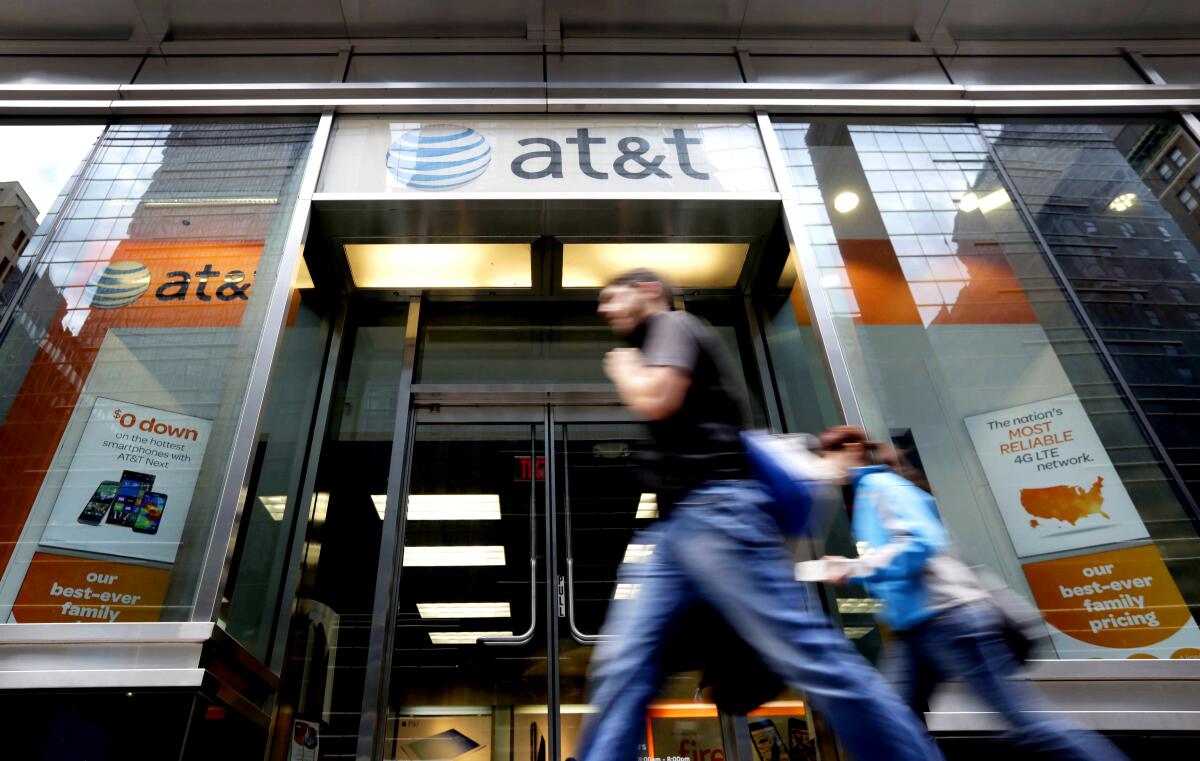Amid Discovery deal, AT&T also is quietly making late fees more likely

- Share via
AT&T merging its WarnerMedia assets with Discovery isn’t the only move by the telecom behemoth that could impact consumers’ wallets.
This week, the company also is making it harder for some people to pay their bills — and increasing the likelihood of late fees.
Tim Ahern pays AT&T about $170 a month for his TV and phone services. He pays his bills on time, so he hasn’t been hit with any late fees, which can run as much as $10.
Even so, the Culver City resident was startled to receive a recent email from the company notifying him of changes that take effect Tuesday.
“Heads up!” the email says, adopting an oddly buddy-buddy tone. “Have you ever forgotten to pay a bill? We hear you. It happens. That’s why we offer pay bill reminders.”
These reminders are basically automated nudges that you may have a balance outstanding as a new billing date approaches. The notices are optional.
AT&T’s hey-dude chumminess notwithstanding, the notification changes are anything but friendly.
The company used to send out the notices five days ahead of a bill’s due date, which in most cases would give a customer sufficient time to make financial amends or get a check in the mail.
AT&T now says that, as of Tuesday, the notification window is being shortened to just three days, which is a much tighter time frame to set things right.
The company also is doing away with automated phone calls notifying customers of billing deadlines, which is noteworthy because AT&T is, you know, a phone company.
Ahern, 71, told me it appeared pretty obvious what the company is up to. “They’re trying to get more late fees,” he said.
Hard to disagree.
AT&T suddenly looks like it’s scrounging for cash after coming up short in its aspirations to be a Hollywood player.
The company spent $85 billion several years ago acquiring Time Warner’s media properties, including the Warner Bros. studio, HBO and CNN.
“We have a unique opportunity to truly lead in the transformation that’s taking place across media and entertainment, direct-to-consumer distribution and technology,” AT&T’s chief executive, John Stankey, said at the time.
Yeah, not so much, it turns out.
By merging its media and entertainment properties with Discovery’s in a $43-billion deal, AT&T is acknowledging that its dreams of Hollywood stardom never panned out.
The new arrangement will allow the company to renew its focus on its core telecommunications operations. And that’s what makes its simultaneous move regarding late fees so questionable.
And predictable.
Taxes, fees and surcharges now constitute about 23% of the average wireless bill, according to the nonprofit Tax Foundation. That means the advertised price, which doesn’t include taxes and fees, is nearly a quarter less than the actual service cost.
AT&T’s changes this week underline the importance of fees to the bottom line of all telecom businesses.
I wrote the other day about how Frontier Communications, which took over Verizon’s California landline operations in 2016, is slapping internet customers with a $7 monthly “Internet Infrastructure Surcharge.”
Frontier Communications is quietly charging internet customers an ‘infrastructure surcharge’ of $7 to recoup routine business costs.
Although the fee may look to Frontier customers like a tax, it is in fact a discretionary charge — a stealth rate hike of 10% to 15% for most of the company’s internet users.
Ryan Oliver, an AT&T spokesman, didn’t have much to say when I asked about the rationale for tightening the billing notification window and doing away with bill-reminder calls.
“In communicating with our customers, we learned that they preferred a bill reminder closer to the due date and that it made them more likely to pay on time,” he said in a brief statement.
I’m not sure how shortening the time frame by two days is “preferred” by customers. The only thing it seems to accomplish is giving people less time to submit a payment.
Dennis Johnson, a Spectrum spokesman, said Southern California’s dominant cable company will notify customers that their billing statement is available “on average 14 to 15 days before payment is due.”
A Frontier spokesman declined to comment.
In the same way that some banks seem eager to have customers run up hefty overdraft charges, AT&T appears to view any financial distress on the part of customers as a business opportunity.
Along with increasing the likelihood of late fees, the company will charge a “convenience fee” if customers “call or chat with us to make or schedule a payment arrangement.”
I’ll give them the benefit of the doubt, despite the ambiguous wording of that clause, and assume the fee isn’t imposed just for “calling or chatting” about rescheduling a payment.
Rather, it’s probably for taking the time of a service rep to help with your problem, even though that’s what the company’s service reps are paid for.
AT&T also will charge a “reconnection fee” if your service is temporarily suspended because of missed payments.
How much are these fees? Good question. The company doesn’t reveal the amounts online, which strikes me as both unfair and mean-spirited.
I phoned an AT&T service rep as a prospective customer. He told me the convenience fee for rescheduling a payment is $7. The reconnection fee runs as much as $35, he said.
That’s $35 for, as best as I can tell, a few keystrokes on AT&T’s part, seeing as you already have all the necessary gear and connections in place.
AT&T’s Oliver said that “services aren’t typically disconnected after a single missed payment.”
He also cited a fee I wasn’t even aware of: A $5 charge “if a customer pays a bill at an AT&T store and uses a customer service representative rather than the automated kiosk,” even though a customer service representative is there to provide customer service.
AT&T has approximately 186 million wireless subscribers, 16 million pay-TV customers and a dwindling number of landline customers.
The company also has more than $160 billion in debt.
Obviously you can’t unwind a financial burden that large solely by nickel-and-diming your more than 200 million customers.
But every late fee — and convenience fee, and reconnection fee — counts.
More to Read
Inside the business of entertainment
The Wide Shot brings you news, analysis and insights on everything from streaming wars to production — and what it all means for the future.
You may occasionally receive promotional content from the Los Angeles Times.












